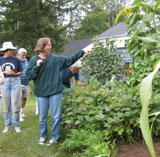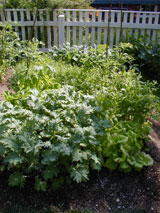Whole Home Resource
Interiors

The Whole Home
How green is your garden?
My mother is an avid organic gardener and what she touches flourishes. In the late 60s and early 70s, when four of her children were of prime weeding age, we lived well off a half-acre vegetable garden and she canned and froze throughout September. She still claims one of her best anniversary presents ever was truckload of rotted manure. (She was not a hippie—she was a 50’s mom, registered Republican, and Sunday School teacher.)
We complained loudly about our enforced weeding. Only one of us thought to profit from the garden and she made a killing one year selling 10-cent jars of horseradish.
I left home for college and, happily, left behind the weeding and a library of Ruth Stout, Euell Gibbons, and various Rodales. For years I tended nothing but a few houseplants. I eventually moved back to New England with the expectation that I would replicate my mother’s garden, on a smaller scale, with no Brussel sprouts.
After spending so many of my formative years weeding, picking bugs, and making manure tea, I knew how to grow a productive organic garden. How hard could it be? However, after nearly 16 years, I’m still trying to achieve a modicum of my mother’s success.

I dream of a small kitchen garden in which lettuce flourishes all summer, my basil is prolific enough for quarts of pesto, my homemade compost is thick enough to smother the weeds, and the tomato hornworms have found another home.
Kitchen Gardens International, founded by Roger Doiron of Scarborough, may have some answers for me. This nonprofit organization has members in 80 countries. The website, www.kitchengardeners.org, describes kitchen gardeners as “stewards of the land, whether it be a farm or a window-box.”"
Kitchen Gardens has a monthly e-zine on the nuts and bolts of growing, cooking, and preserving. Doiron describes the content as “lots of food and lots of food for thought.” International Kitchen Garden Day is August 26 and will give you a chance to tour local kitchen gardens. Doiron created the day three years ago in response to his discovery that February is designated "National Snack Food Month".
I asked Roger for resources and he suggested Garden Primer by Maine’s Barbara Damrosch. It’s a comprehensive gardening book with two designs for kitchen gardens, one simple, one more elaborate. He also suggested a new book by Jennifer Bartley, Designing the New Kitchen Garden.

If you want hands-on assistance in creating a kitchen garden, there’s David Buchanan of Stillman Design in Portland, www.stillmandesign.com. He will help you design and create your own kitchen garden. His emphasis is on growing heritage varieties and introducing people to new plants. He plants intensively and his own 10’ x 10’ urban garden last year included 2 kinds of kale, lettuce, sweet basil, wild arugula, 3 kinds of tomato, sweet peppers, celery, black mustard greens, Swiss chard, skirret, black Afghan carrots and ground cherries. If you’ve been bitten by a gardening bug but are still looking at an expanse of lawn, David says now is the time to start designing and preparing a garden for next year.
After a few phone calls, I did find a local source for organic vegetable seedlings. This year O’Donal’s in Gorham will carry organic vegetable seedlings from Little River Flower Farm in Buxton. You can buy organic seed from Johnny’s in Winslow, Maine. Call toll-free 1-877-564-6697 or look at www.johnnyseeds.com. The photos on the website are mouthwatering!
Why should your garden and your lawn, be organic? There are quite a few reasons. According to the National Audubon Society:
- Lawn pesticides cause the deaths of 67 million birds per year. (This is a conservative estimate.)
- In a recent study of pesticide exposure of 110 children, traces of garden chemicals were found in 99% of the children. Concentrations were significantly higher in children whose parents reported they used pesticides in their gardens.
- Commonly used pesticides are routinely found in surface and ground water.
- Pesticides kill beneficial insects such as the bees we rely on for pollination.
Unfortunately, homeowners are using 50% more herbicides (a pesticide used for weed control) than they did 20 years ago. There’s more information on how to change our practices and have an environmentally green landscape at www.audubonathome.org, at www.nrcs.usda.gov/feature/backyard or at www.yardscaping.org.
For parents who lack my mother’s green thumb (and time) but want their children exposed to organic gardening and farming principles, there’s Farm Camp at Broadturn Farm in Scarborough.
Children ages 4-9 can attend a week-long day camp this summer where they’ll learn how to take care of animals, learn about organic gardening and experience the satisfaction of “good work for good food”. There are also still openings for Junior Counselors at the camp. These are kids 12-15 with an interest in both early childhood education and sustainable living who volunteer their time. For details, call 510-1682 or visit www.broadturnfarm.com. Families without their own gardens will be able to benefit this year from the Broadturn Farm stand with “pick-your-own” options.
My mother is in her mid-seventies, still caring for a large garden, and producing organic vegetables so beautiful I’m ashamed to say I sometimes get a sour taste in my mouth from envy.
